Overview Of Labyrinthitis
Labyrinthitis is irritation and swelling of the inner ear. It can cause vertigo and hearing loss.
Commonly Associated With
Bacterial labyrinthitis; Serous labyrinthitis; Neuronitis – vestibular; Vestibular neuronitis; Viral neurolabyrinthitis; Vestibular neuritis; Labyrinthitis – vertigo: Labyrinthitis – dizziness; Labyrinthitis – vertigo; Labyrinthitis – hearing loss
Causes Of Labyrinthitis
Labyrinthitis is usually caused by a virus and sometimes by bacteria. Having a cold or flu can trigger the condition. Less often, an ear infection may lead to labyrinthitis. Other causes include allergies or certain medicines that are bad for the inner ear.
Your inner ear is important for both hearing and balance. When you have this condition, the parts of your inner ear become irritated and swollen. This can make you lose your balance and cause hearing loss.
These factors raise your risk for labyrinthitis:
- Drinking large amounts of alcohol
- Fatigue
- History of allergies
- Recent viral illness, respiratory infection, or ear infection
- Smoking
- Stress
- Using certain prescription or nonprescription medicines (such as aspirin)
Symptoms Of Labyrinthitis
Symptoms may include any of the following:
- Feeling like you are spinning, even when you are still (vertigo).
- Your eyes moving on their own, making it hard to focus them.
- Dizziness.
- Hearing loss in one ear.
- Loss of balance — you may fall toward one side.
- Nausea and vomiting.
- Ringing or other noises in your ears (tinnitus).
Exams & Tests
Your health care provider may give you a physical exam. You may also have tests of your nervous system (neurological exam).
Tests can rule out other causes of your symptoms. These may include:
- EEG (measures the electrical activity of the brain)
- Electronystagmography, and warming and cooling the inner ear with air or water to test eye reflexes (caloric stimulation)
- Head CT scan
- Hearing test
- MRI of the head
Treatment Of Labyrinthitis
Labyrinthitis usually goes away within a few weeks. Treatment can help reduce vertigo and other symptoms.
Medicines that may help include:
- Antihistamines
- Medicines to control nausea and vomiting, such as prochlorperazine
- Medicines to relieve dizziness, such as meclizine or scopolamine
- Sedatives, such as diazepam (Valium)
- Corticosteroids
- Antiviral medicines
- If you have severe vomiting, you may be admitted to the hospital.
Follow your provider’s instructions for taking care of yourself at home. Doing these things can help you manage vertigo:
- Stay still and rest.
- Avoid sudden movements or position changes.
- Rest during severe episodes. Slowly resume activity. You may need help walking when you lose your balance during attacks.
- Avoid bright lights, TV, and reading during attacks.
- Ask your provider about balance therapy. This may help once nausea and vomiting have passed.
You should avoid the following for 1 week after symptoms disappear:
- Driving
- Operating heavy machinery
- Climbing
- A sudden dizzy spell during these activities can be dangerous.



